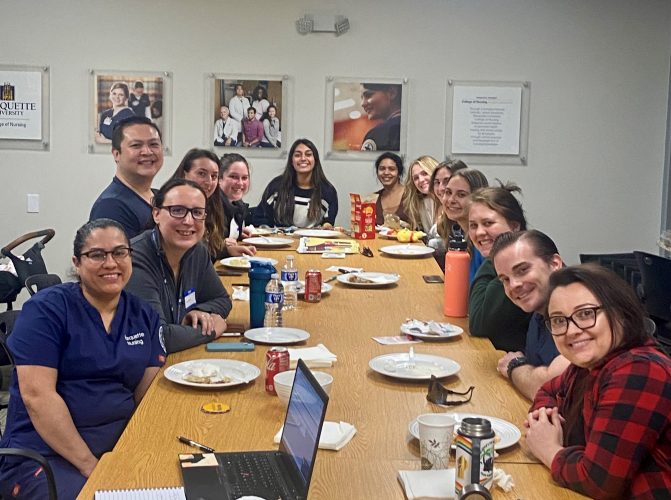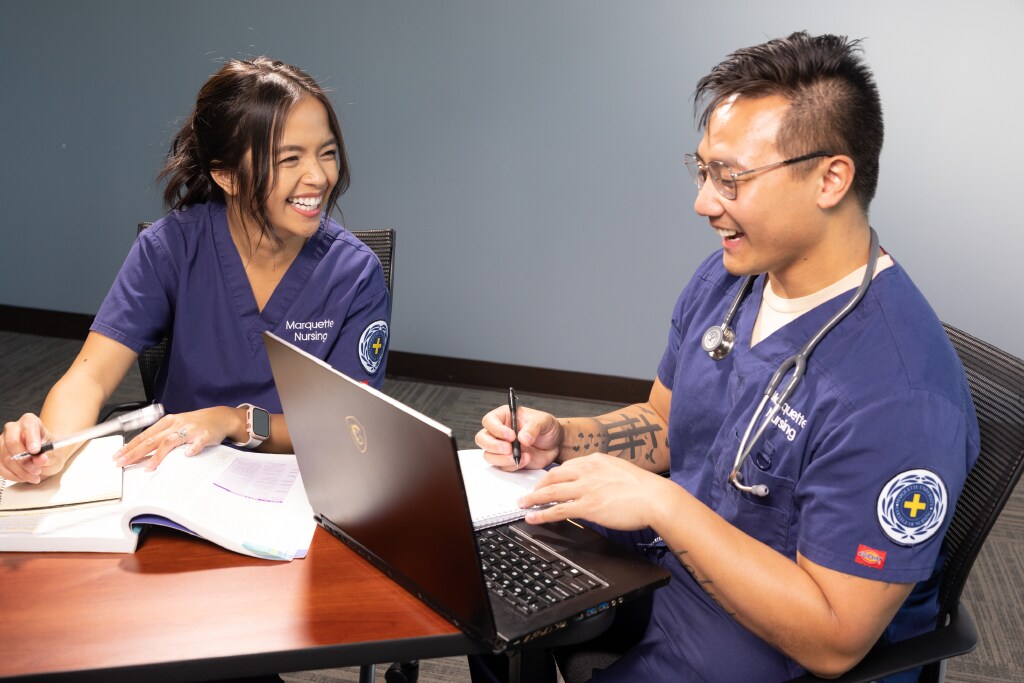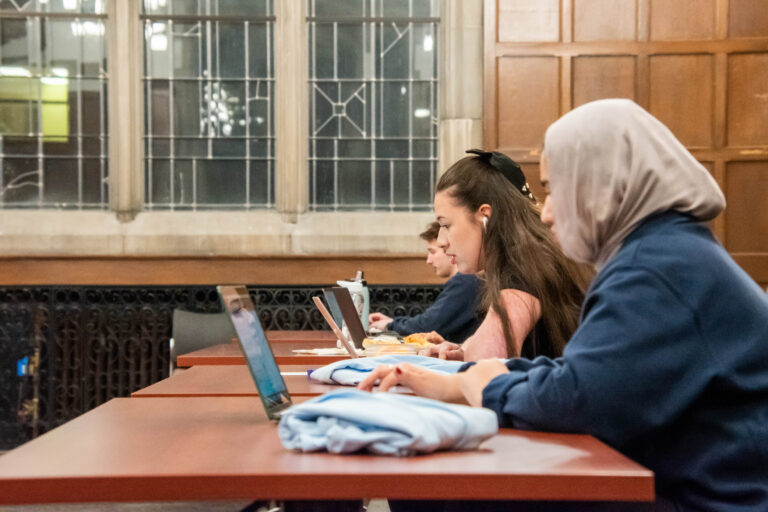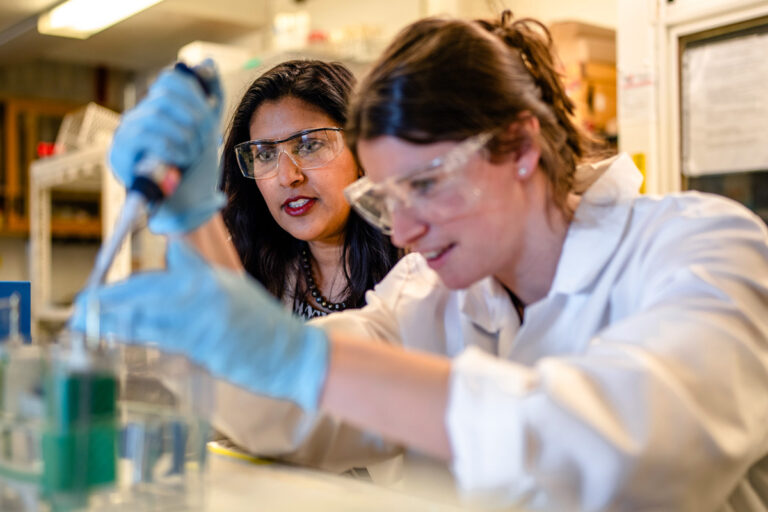Abeel Mujaddidi first heard of Marquette the way many outside the Midwest do: through its basketball team.
“I was doing research and saw Marquette, then remembered, ‘Hey, Jimmy Butler went here and Dwyane Wade went here,’” Mujaddidi says.
Originally from Sacramento, California, Mujaddidi is a student in Marquette’s Direct Entry Masters of Nursing (MSN) program, part of the college’s Pleasant Prairie cohort, which conducts parts of its courses online and the rest in-person at a campus in Kenosha County, roughly 40 miles south of Milwaukee. Clinicals for the program take place in southern Wisconsin and northern Illinois.
In recent years, Pleasant Prairie has attracted more students from the west coast, specifically California. More than 22% of the students who began their studies in spring 2023 came from the Golden State, the highest percentage in any of the last eight Pleasant Prairie groups.
For students like Vick Medina-Chavez, who comes from the Bay Area and wants to work in geriatric nursing, moving to Wisconsin for graduate school was a much cheaper option than staying closer to home.
“The cost is tremendous,” Medina-Chavez says. “I’ll never forget that one school I applied to close to home cost $100,000. With the rent costs in the Bay Area on top of getting a $100,000 degree, that was the point at which I thought I was never going to be able to do this.”
Marquette’s program costs $63,000 and takes between 19 and 21 months to complete. It is also direct entry, meaning that students are not required to have a bachelor’s degree in nursing to enroll.

MSN program director Dr. Kathleen Muglia says that it’s designed to address some of the obstacles that have kept people from becoming nurses.
“We know that there are many more qualified applicants than are able to receive education for nursing and enter into the field across the industry,” Muglia says. “We’ve worked hard to alleviate some of the highest barriers to entry.”
Medina-Chavez is the kind of nontraditional student that the Pleasant Prairie program hopes to help. A mother of two, Medina-Chavez spent a decade earning her undergraduate degree at Ohlone Community College, sometimes taking just one class per semester while balancing both work and motherhood. The combination of affordability and asynchronous learning in Marquette’s MSN allows her to maintain that balance while accelerating degree progress.
“What other program is going to give you the opportunity to serve others and do so without starting from the bottom all over again?” Medina-Chavez says. “Most programs make you go all the way back, especially in California. Direct entry MSNs really don’t exist out there.”
Clinical instructor Dr. Tina Mallas has seen dozens of students, many from the west coast, come through her classes. One of the biggest challenges she has to address is providing support to students thousands of miles from home without seeing them in-person frequently. In addition to holding regular office hours, Mallas structures her classes so that each lesson is delivered in the best possible modality.
“We teach the students the theory online, and then they go into the skills lab, the simulation lab or their clinical sites and apply the knowledge to actual, live patient-care settings,” Mallas says.
“Some faculty across the country, and not just in nursing, haven’t grasped the pedagogical approaches that are needed for online education,” Muglia says. “It’s not just taking the course and putting it online. There’s a lot of course design that’s needed on how you scaffold learning to deliver content in different ways.”
Switching between virtual and in-person learning is tricky enough but doing it with people that moved across the country requires even more personal assistance than usual. Muglia sees students move from the west coast frequently without fully appreciating how different it can be to go to college halfway across the country.
When asked what advice Muglia would have for these first-time Midwesterners, she replied “bring snowshoes and a parka.”
“Some students think that they’re going to bring their motorcycle here,” Muglia says. “You’re not going to get to clinicals on your motorcycle in February.”

Both Medina-Chavez and Mujaddidi quickly found other people like them. Mujaddidi regularly plays pickleball with a fellow graduate student from San Diego and is in a study group with multiple people from the Portland, Oregon, area.
Meanwhile, Medina-Chavez finds herself connecting with people who share traits other than location.
“The girls I’m bonding with are kind of at the same stage of life. They’re engaged or have children and I think we kind of gravitate to what’s similar,” Medina-Chavez says.
That bond is also evident to professors; Mallas jokes that the west coast transplants all immediately sat next to each other during orientation despite none of them having met yet. Forming relationships with other students based on these types of similarities can be the difference between merely surviving and thriving.
“It’s great to discover that hey, this person has a similar background or this person lives right down the street from me and maybe we can study together,” Mallas says. “Then they can kind of get to know each other and form support groups for each other.”
Marquette’s MSN program does a lot more than entice students to make the 2,000-mile journey from the shores of the Pacific to the shores of Lake Michigan; it also provides the resources, personal attention and sense of community that gets them to stay.
“I think I got to the point where I didn’t think that a master’s degree was going to happen anymore,” Medina-Chavez says. “It felt like ‘it’s OK that I didn’t do it, I’ll make my way somewhere else.’ Marquette opened that door of opportunity for us that I thought was lost.”



